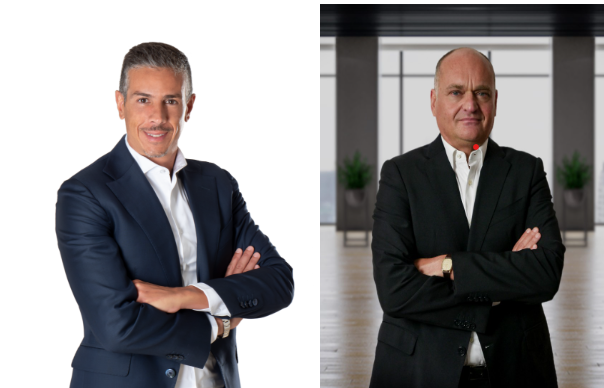
Digitalisation, ESG and robotics are the three key themes set to impact the global consumer market, according to Packaging Gateway’s parent company GlobalData. Hybrid packaging company Berlin Packaging’s beauty division recently won the gold award at the Pentawards 2022 in London and named ‘Most innovative perfumery product of 2021” by Luxe Life Magazine for its boundary-pushing designed bottle which kept all three of these key themes in mind.
Berlin Packaging says the Ninu Perfume is the first AI-enhanced sustainable smart perfume with the capability to monitor the user’s preferences and their variations in order to suggest the most suitable fragrance at any time. Its design also allows the user to keep the outer container whilst replacing and recycling the cartridges.

Packaging Gateway’s Ryan Ellington spoke to chief marketing officer at Berlin Packaging EMEA, Dario Bassetti and chief executive officer at Berlin Premi Industries, Alessandro Prestini about the innovation created by its beauty divison, Berlin Beauty.
What is meant by hybrid packaging?
Dario Bassetti: Being a hybrid packaging supplier means we represent a one-stop shop for our customers, bringing together the best elements of design and innovation, manufacturing services and customer solutions.
Berlin Packaging takes care of the entire packaging cycle by supporting any customer’s requirement, regardless of the material thanks to a vast network of glass, plastic, and metal packaging and closures. Our in-house consultancy Studio One Eleven offers customers innovative, standard, or customised solutions, consistently in line with the latest trends.
With our division Berlin Beauty, we partner with companies of any size operating in the beauty industry, supporting them from product design to production, including primary packaging, secondary packaging, decoration, and formula
What was the reason for your material choice?
DB: Sustainability is a key strategic driver for Berlin Packaging, and when designing our solutions we focus on our circularity, optimisation and refill/reuse strategies.
Alessandro Prestini: The bottle of Ninu is designed with durable and sustainable materials in mind, such as refillable cartridges made of recycled glass. The product attributes allow us to offer a product that is truly intended to reuse and minimise waste.
Glass is a very sustainable material. It is 100% recyclable and it promotes the value of circularity, guaranteeing at the same time high performance and quality. That is why we decided to focus on a sustainable material when designing the refill cartridges of Ninu Perfume, a core component of the packaging.
How does Berlin Packaging use glass at a sustainable level?
DB: Berlin Packaging considers glass one of the most appropriate options for sustainability. It is working to foster the use of recycled glass content (cullet) to reduce the environmental impact along with the production phase (with a reduction of CO2 emissions generated) and to contribute to a long material life cycle.
Our company is promoting a sustainable culture along the glass value chain, working shoulder to shoulder with suppliers committed to using renewable energy in the production phase, contributing to a significant decrease in the packaging’s carbon footprint. In some cases, when this is not feasible, we also consider the possibility of compensating the emissions generated, thanks to offsetting programmes.
The design’s refill option also helps us to reduce the overall carbon footprint.
What carbon footprint does the packaging leave?
AP: In the design phase, the goal was to create a product to reduce the 12 billion tonnes of plastic waste in the beauty industry and build a refillable design. Generally, when a product is used for more than ten refills, the carbon footprint reduces by an average of 50%. For this reason, the decision was taken to develop an electronic device that can be refilled continuously, offering potentially infinite reuse and, consequently, a reduction in the environmental impact.
Did creating a sustainable production process and end-packaging product lead to any challenges?
AP: Sustainability has always been a critical point of this project. Moreover, in the tech world sustainability often means a product’s durability, so we had to make sure the product would have as long a life cycle as possible. Our goal was to create a highly sustainable development while maintaining the right aesthetics and cost.
What is the impact of Ninu perfurme when it becomes waste?
AP: Inside the device is a recyclable cartridge with three fragrances that can be replaced once finished and exchanged with each other. We’re now evaluating whether to produce them in PET, the recyclable material, or in rPET, recycled PET.
DB: We aim to be an industry-leading provider of sustainable packaging products and services at Berlin Packaging. The perfect package is about more than just protecting and preserving the product inside and it’s not only about the sustainability of the packaging material.
At Berlin Packaging, we offer different services. We assess the product’s environmental impact throughout its entire life-cycle (from sourcing to manufacturing, distribution, and end-of-life) thanks to a dedicated life-cycle analysis (LCA). Berlin Packaging uses LCA tools to calculate a product’s carbon footprint such as its greenhouse gas emissions, water use, mineral resource use, and fossil fuel use. Berlin Packaging’s LCA tool follows the guidelines of ISO 14040 to determine and document the scope, assumptions, consistent boundary conditions, and data sources.




